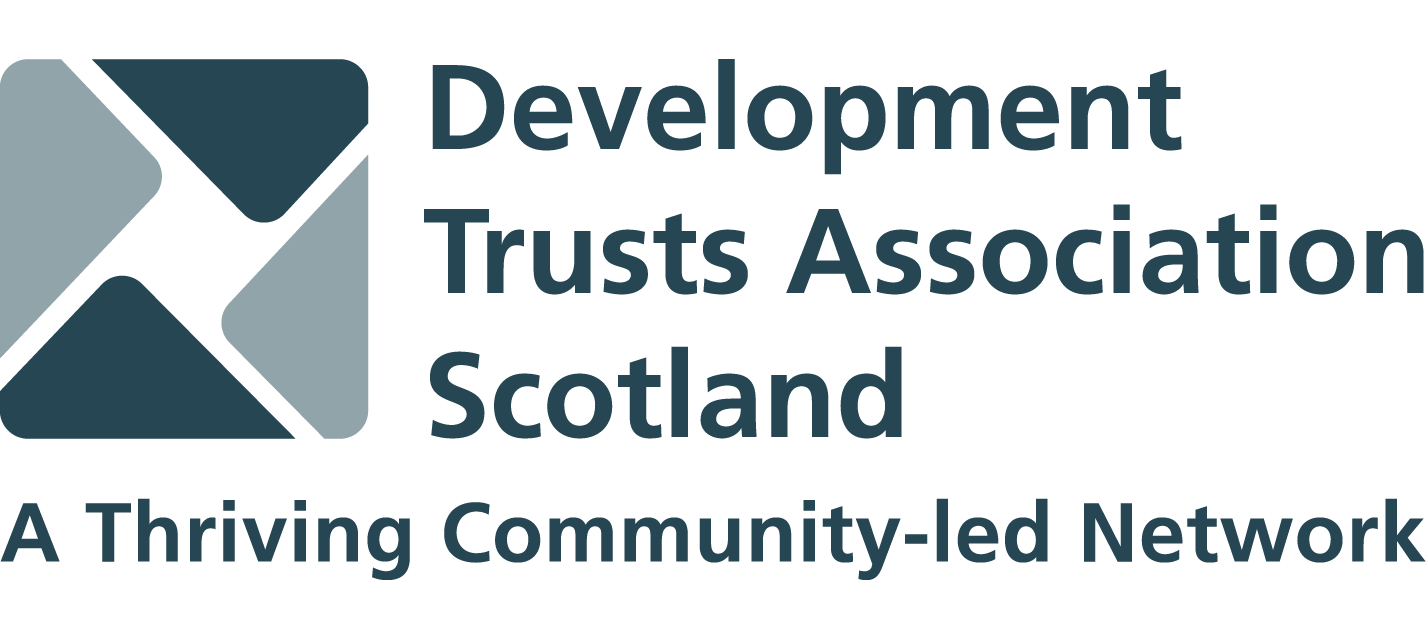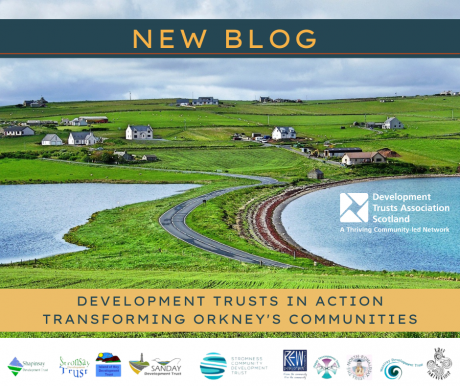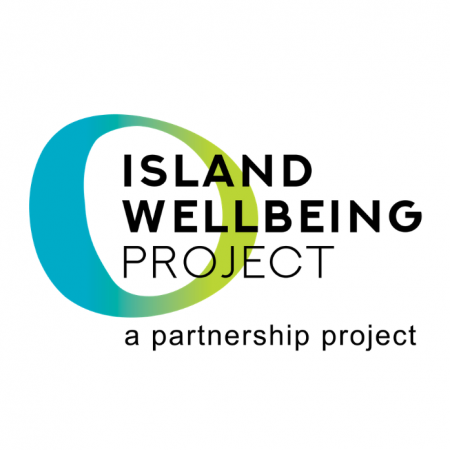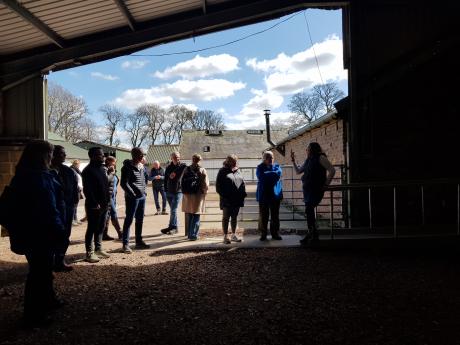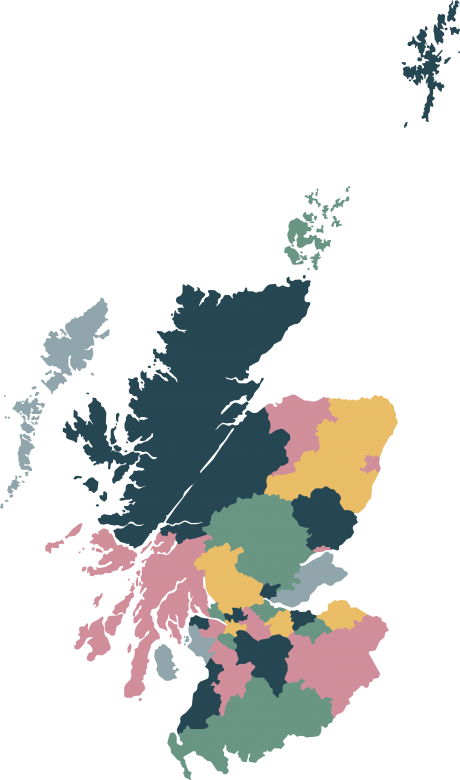Developing a community led approach to tourism with Scottish Community Tourism (SCOTO)
Posted on: Tuesday 28th May, 2024
Carron Tobin, SCOTO’s exec director, has been on the road supporting a number of development trusts across Scotland in developing a community led approach to tourism. Does this sound appealing? Read on!
Tourism – a dirty word or a force for good?
Is it time for your community to Press Pause?
As the number of community development trusts across Scotland has grown there also has been a curious tension developing within many communities where tourism is being identified as a priority theme but also often seen as a dirty word.
There are many very easily explained reasons for this – not least the sense that tourism just happens to communities but also the word tourism focuses on the tourist and not the place they are visiting.
Here at SCOTO we talk about the visitor economy which is much more about the place and also the numerous interactions between visitors and locals that make that local economy work.
We have devised a new approach to tourism which defines and puts the community’s interests to the fore and encourages individual communities to become serious players in Scotland’s visitor economy.
Who is SCOTO?
SCOTO - Scottish Community Tourism - is the only dedicated network in the UK supporting community tourism. With 300 plus SCOTO Networkers, spanning the breadth of Scotland, we provide peer to peer learning and support as well as empowering individual communities keen to embrace community led tourism. Established just over 2 years ago with the ambition to recalibrate tourism in Scotland to deliver for communities and environment first, we are finding that community led tourism is very much of its time.
What is Community Led Tourism?
Community led tourism refers to communities that are providing a visitor facing service, facility or experience as a social or other not for profit enterprise. The visitor facing activity may not 100% of what is on offer and it may not be the main driver – but the visitor’s experience of the local area is enhanced and the community benefits from their spend and interaction.
And it’s not new! Communities have been providing services and facilities for visitors for decades – local heritage centres being a classic example. But with community empowerment in Scotland we are seeing more and more communities acquiring assets and operating charities and social enterprises which have a visitor facing element to what they do. More and more communities are taking over toilets and providing visitor information – and considering tourism uses for now redundant churches.
However, another element of community led tourism is community led destination development, management and promotion. This is new and is something SCOTO is putting considerable energy into through its newly developed Press Pause initiative.
Why Press Pause?
SCOTO is encouraging all communities to take time to Press Pause. This is partly in recognition that we are in a new era in tourism. Change was coming anyway but has been accelerated by Covid and Brexit – and recognises that we are in the middle of a climate emergency impacting on travel choices and business operations, and technology is revolutionising every aspect of everyday life. Increasingly visitors are seeking much more authentic experiences and to meet local people – and ethical travellers really want to slow down and immerse themselves in their host community.
Who Presses Pause?
At its heart Press Pause is about business and community interests sitting down together to collectively consider what is and isn’t working and what could be done differently or better in their community. Businesses are a vital part of our communities, especially those owned and run by locals that employ local people, whose kids go to the local school and who support the local suppliers, events and sports clubs. It is vital that business and community interests explore ideas together.
How do they Press Pause?
Fundamentally SCOTO believe this approach should be owned and led by local community development trusts where these exist – and could be the basis for setting one up where it doesn’t already exist. Press Pause is about a partnership between local community development trusts and SCOTO.
What happens?
Over a half day workshop business and community interests – basically people with skin on the game within the local community – explore six topics together. This is facilitated which ensures everyone can contribute and also allows perceptions to be challenged based on experience from elsewhere.
Topics include
• An initial appraisal of what is currently working and what is not working
• Understanding the geography of the destination – is it the community and its rural hinterland? Is it a number of communities which form a valley, an island, a neighbourhood or a coastline?
• Considering visitors over time – past, present and future?
• Who are the main competitors? Where are good comparartors?
• A destination competence appraisal – exploring 16 different criteria and jointly appraising the current state of play
• Sense of place and place branding – exploring what makes the community what it is today and what really differentiates it from other places
So What?
SCOTO then do the heavy lifting. SCOTO produces a detailed easy read report in slide format which summarises the findings and specifically highlights the numerous opportunities for community led tourism. It is set out in a format that allows anyone not involved to understand the process – notably funders – and to provide evidence of need for change.
An online meeting allows the draft report to be reviewed and tweaked as there are always local nuances! And this meeting specifically seeks to draw out an activity plan. Of all the ideas set out which should be progressed? What are the quick wins as well as longer term strategic actions that need a kick start?
Next Steps
Getting some quick wins underway is key but it is also important to share the outputs with the wider community and seek buy in to the activity plan and also provide everyone with the opportunity to get involved in making their community a better place to live, work and visit.
Recent research has shown 1 in 5 people in Scotland volunteer. Wouldn’t it be great if more and more people of all ages within a community got involved in simple activities that showcase their community at its best and help visitors enjoy the local area as a force for good. People volunteer when they are passionate about something – wanting to give something back and make a difference. Most residents are passionate about where they live and a few hours supporting community led tourism can lighten loads and make a big difference.
Press Pause is the ideal catalyst for embracing local community spirit and shaping how to share it with visitors who in turn want to become temporary locals and give something back.
Is your community ready to Press Pause?
On 25 June Carron Tobin and Di Smith from SCOTO will join DTAS to deliver a webinar all about Press Pause and community led tourism with a presentation and lots of time for questions and discussion. Sign up on our Eventbrite page at https://www.eventbrite.co.uk/e/scoto-community-led-tourism-press-pause-t....
Contact Di, SCOTO’s coordinator on info@scoto.co.uk and visit our websites www.scoto.co.uk and www.belocal.scot .
“Press Pause really helped steer our course and has given us a fantastic platform to work from.” Selkirk and The Valleys
“Not only was everyone contributing at Press Pause but I felt the quality of their contributions was very positive and encouraging leaving me feeling optimistic about the future. The day was both worthwhile and enjoyable.” Braemar
“Undertaking the Press Pause workshop was invaluable. Learnt so much, even about things you thought you knew about locally as different folk had different perspectives. Having an independent but knowledgeable coordinator was hugely helpful to question long held perceptions and pull in experience from elsewhere.” Langholm
